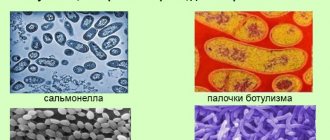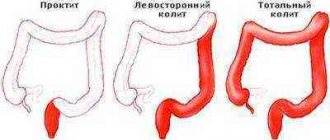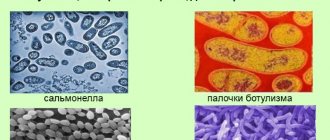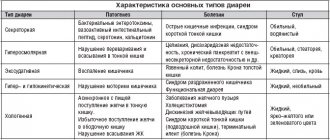Diarrhea without fever or vomiting causes
Various symptoms can accompany diarrhea in a person.
However, diarrhea without fever and vomiting in adults is especially common. And there can be an incredible number of reasons for this condition. But we can distinguish several groups of factors that occur most often. And not all of them go away on their own at home. Diarrhea is not an independent disease with a clinical picture, but a pronounced symptom of problems in the gastrointestinal tract or the entire body. Interestingly, diarrhea is not always a sign of any physiological disease. Very often the body experiences this condition as a result of stress or emotional overstrain.
Features of digestion
Diarrhea as a symptom is the passage of liquid stool for a certain period of time. It can be either one-time or long-term. Constant or periodic with intensification and attenuation of attacks. It is generally accepted that acute diarrhea lasts 2-3 weeks, and chronic diarrhea lasts a month or longer.
It is normal for the body to excrete 100 to 300 g of feces daily 1-2 times a day. When consuming certain foods that have a cleansing effect, this frequency can be increased.
Stool loosening usually occurs due to a sharp increase in water content in the body and digestive organs. With diarrhea, stool consists of almost 90% liquid. Based on the amount of stool, one can assume the cause of its origin:
- pathologies of peristalsis - daily volume does not increase, but the frequency may change;
- pathologies of absorption by the intestinal wall - the number of bowel movements noticeably increases due to insufficient absorption of food.
However, these are only internal reasons. And diarrhea may not always be hidden behind them. Several other factors lead to diarrhea without fever and vomiting in an adult.
Main causes of diarrhea
Behind such a symptom as diarrhea in combination with mild nausea or without it at all, the following reasons are usually hidden:
- indigestion after overeating or excessive consumption of fatty, high-calorie foods;
- minor food poisoning;
- allergic reaction to certain foods;
- use of medications and specific supplements (antibiotics or sugar substitutes, for example);
- severe stress, fear, fright;
- traveler's diarrhea (change of diet, water, climate).
In most cases, diarrhea goes away within 3-4 days if caused by the factors described above. But it happens that pathology develops against the background of more serious causes.
Important! The most dangerous causes of diarrhea without vomiting and fever are illnesses and infections. These include dysentery, salmonella, and intestinal flu.
In addition to viruses and infections, a similar symptom occurs with diseases of the digestive system - gastritis, ulcers, ulcers, and hepatitis. Functional deficiency due to the lack of certain enzymes also leads to diarrhea, as do diseases of unknown etiology such as Crohn's. Severe poisoning with metals and chemicals is usually accompanied by vomiting, but can only be reflected by diarrhea.
But in any case, acute diarrhea should be stopped first by using Loperamide or other similar medications. Then you need to find out an accurate diagnosis and carry out treatment. In the case of some viruses and diseases, this should only be done in a hospital.
Warning signs
If diarrhea without fever and vomiting is accompanied by a certain group of symptoms, you must call an ambulance. These are the symptoms:
- severe dry skin;
- chapped lips;
- uncontrollable thirst, which cannot be eliminated even by drinking large amounts of water;
- difficulty going to the toilet, problems with urination;
- frequent, very severe and painful diarrhea;
- nausea begins;
- palpitations are felt;
- convulsions or even loss of consciousness appear.
Even one of all these signs is evidence of the development of acute dehydration. When potassium and other nutrients are washed out of the body, the heart malfunctions, leading to coma and heart problems. Even death is possible.
First aid for diarrhea
The first thing to do to bind and eliminate possible poisons is to take sorbents. For example, activated carbon or Enterosgel. If the diarrhea is very severe, use Loperamide. You should also take care to prevent dehydration. To do this, you need to take glucose-saline solutions to maintain sugar and electrolyte levels.
Take Regidron or Gastrolit according to the instructions for diarrhea to satisfy this point.
If you can’t buy the product, prepare it yourself in 1 liter of water: take half a spoon of soda, a spoon of salt, ¼ spoon of potassium chloride and 4 spoons of granulated sugar. You need to take the medicine 0.5-1 glass throughout the day. If potassium chloride is not available, you can make a decoction of dried apricots or add fresh orange juice.
If you have severe diarrhea, you should not eat as usual. In the first day or two, it is better to completely remove vegetables, fruits, and meat from your diet. Replace them with porridges - rice or buckwheat. Drink strong tea without sugar and eat crackers. And if by 3-4 days you feel noticeably better, then you can forget about the problem. But if you feel worse, be sure to consult a doctor.
Source: https://nobest.ru/ponos-bez-temperatury-i-rvoty-prichiny.html
How to properly provide first aid for such symptoms
It is unlikely that you will be able to completely get rid of vomiting and high fever without a doctor. After all, first of all, it is necessary to establish the exact reasons that caused the appearance of these symptoms. Nevertheless, it is quite possible to alleviate the patient’s condition by providing him with pre-medical care. In this case, there are several drugs that can be safely given even before the person is examined by a doctor. These are, in particular, gastric lavages, antispasmodics and, of course, absorbents. Currently, pharmacies have a fairly wide selection of such drugs. Moreover, they are often present in home medicine cabinets.
The most common medicine in such situations is Activated Charcoal. Calculating the required dosage is quite simple - 1 tablet per 10 kilograms of weight. Do not forget that this remedy must be washed down with plenty of water. Otherwise, a new problem may well appear - constipation will appear, and the reverse process of toxin absorption will begin in the intestines.
In addition to Activated Carbon, there are a number of absorbents that will be very effective in such a situation. These are, in particular, Sorbex, Sorbolong, Polysorb and so on. Among the most popular antispasmodics are Papaverine, Drotaverine and No-shpu. When taking any of the above remedies on your own, you must carefully re-read the instructions. Firstly, this is necessary in order to choose the right dosage. Secondly, a person may well have an individual intolerance to some of the components of the drug. Third, be sure to read the section that describes side effects.
If you are sure that nausea and fever are the result of recent consumption of spoiled foods, then the patient can have a gastric lavage or an enema. Before being examined by a doctor, you should also drink 8 glasses of boiled water with the addition of salt, soda and potassium permanganate. After this, you should induce a gag reflex by pressing on the root of the tongue.
In order to temporarily reduce the temperature, it is allowed to use antipyretics - Panadol or Ac
pirina. At the same time, there is no need to give a person any antibiotics without a doctor’s prescription, since vomiting and fever are not always caused by a bacterial infection. The duration of treatment directly depends on the root cause that caused the symptoms. Therapy will include the drugs already mentioned above, as well as immunomodulators. In addition, the doctor will already decide on the need to use antibiotics and anti-inflammatory drugs.
Causes of diarrhea without fever and vomiting in an adult: the most common factors
Various symptoms can accompany diarrhea in a person. However, diarrhea without fever and vomiting in adults is especially common. And there can be an incredible number of reasons for this condition. But we can distinguish several groups of factors that occur most often. And not all of them go away on their own at home.
Diarrhea is not an independent disease with a clinical picture, but a pronounced symptom of problems in the gastrointestinal tract or the entire body. Interestingly, diarrhea is not always a sign of any physiological disease. Very often the body experiences this condition as a result of stress or emotional overstrain.
Diarrhea without fever in an adult: causes and treatment
[adsp-pro-1]
Intestinal disorder is not an independent disease. Rather, it is a sign of inflammation or irritation of the intestines, which occurs for a variety of reasons. Diarrhea without fever is much more common in adults than in children, but this does not exclude intestinal flu, colitis, or food poisoning.
Treatment methods
Loose stools with water without fever appear in an adult for various reasons. Accordingly, the methods of treating the disorder differ. With a mild form or a relatively safe reason (excitement, too much festive dinner), the symptoms disappear on their own.
If diarrhea does not subside, then in the absence of fever and additional signs in the form of mucus or blood in the stool, you should contact a specialist who will prescribe the necessary treatment:
- Sorbents . They are prescribed primarily to eliminate the symptoms of the disorder. This is Activated carbon, Smecta. They adsorb toxins, gases and remove them from the intestines. Thus, flatulence and bloating, which cause discomfort, are eliminated.
- Enzyme preparations . To improve food digestion, enzyme preparations are used - Creon, Festal, Mezim.
- Antibacterial drugs . Prescribed if it turns out that diarrhea without fever is caused by infections. For the same purposes, intestinal antiseptics (Enterofuril, Nifuroxazide) are taken, which act in the intestinal lumen, destroying microbes.
- Probiotics . Diarrhea in an adult that occurs without fever cannot be cured without probiotics. Hilak Forte, Linex restore healthy intestinal microflora.
- Antidiarrheals . They are used to reduce intestinal motility. You cannot use such drugs on your own. So, for irritable bowel syndrome, you can take Lopedium or Imodium. But for infectious diarrhea, Lopedium is prohibited, since decreased motility does not allow the pathogens to be effectively removed from the intestines.
- Plant decoctions. To reduce excessive intestinal activity, decoctions of plants with an astringent effect are prescribed: oak bark, chamomile, cinquefoil root. The decoction should be drunk all day.
[adsp-pro-6]
For infectious diarrhea, Galavit is often prescribed. This is an intestinal immunomodulator that can not only destroy microbes, but also increase the local immunity of adults and children.
Important! During treatment you should follow a diet. In this case, the diarrhea will go away faster.
Diarrhea without fever appears in adults both with normal indigestion and with stomach diseases and intestinal infections. If the symptom lasts more than 4 days, you should consult your doctor and start treatment.
[adsp-pro-7] [adsp-pro-9] (
2 5.00 out of 5) Loading... [adsp-pro-10]
Source: https://OtPonosa.com/simptomy/ponos-bez-temperatury.html
Vomiting and diarrhea without fever: causes, symptoms, treatment, what to do
Causes Treatment
What is it, the causes of vomiting and diarrhea without fever in an adult, what are the symptoms and signs of diarrhea and vomiting, how to treat and what to do, what medications to take, what diet to follow.
Symptoms of vomiting and diarrhea are associated with many diseases and malfunctions of the body. Most often, symptoms appear due to eating poor quality food. With a sharp deterioration in health and in addition to other symptoms, this may indicate diseases of the digestive tract.
Causes and symptoms
To find out the causes of vomiting and diarrhea, the doctor will ask about symptoms and signs, what foods you have eaten recently, injuries, and other symptoms.
A bacterial infection can be judged by symptoms: nausea, weakness, vomiting, chills, diarrhea.
Abuse of fatty foods, alcohol and overeating may cause nausea.
Rotavirus infection
More often it is expressed in a disorder of the digestive tract. If your immune system is weak, there may be complications. Treatment on average takes about 1 week. The disease is transmitted by airborne droplets, coughing or sneezing, and it is possible to become infected through dirty hands or contaminated food.
Learn more about rotavirus infection »
Food poisoning
Symptoms of food ingestion may include:
- Nausea
- Diarrhea
- Vomit
- Increased salivation
- temperature increase
- Lethargy
Food poisoning occurs due to shipped products containing microbes with toxins. Increased chance of traveling to places where there are unsanitary conditions, dirty water, and unprocessed raw food.
Learn more about food poisoning »
Stress
After stress or a nervous breakdown, the body is weakened and diarrhea appears. Accompanied by headache. If diarrhea, vomiting and nausea do not go away within a few days, consult a doctor.
Gastritis
With gastritis or inflammation in the gastric mucosa, the following appears:
- Nausea
- Diarrhea or constipation
- Abdominal pain
- Heartburn
- Weakness in the body
- Belching with a sour smell
- Increased salivation
- Dry mouth
- Decreased appetite
- Bloating
- Anemia
With gastritis, blood pressure decreases. Inflammation in the stomach can begin from hot burns or alcohol, medications, stress or poor diet.
Pancreatitis
With pancreatitis, inflammation occurs in the pancreas. Symptoms of pancreatitis:
- Abdominal pain
- Temperature more than 38 degrees
- Pulse more than 90 beats/min.
- Blood pressure is less than 90 mm/Hg.
- Lack of appetite
- Nausea
- Vomit
- Dry mouth
- Belching
- Hiccups
- Bloating
- Diarrhea or constipation
The disease may appear due to alcohol abuse, cholelithiasis, or abdominal trauma.
Dysbacteriosis
With intestinal dysbiosis, the microflora is disrupted. Symptoms of dysbiosis:
- Diarrhea
- Nausea
- Bloating
- Abdominal pain
- Bad breath
- Belching
Dysbacteriosis appears after eating food that the body has poorly digested during treatment with antibiotics. This disease occurs from eating food that the body does not accept, during treatment with antibiotics, poisoning, etc.
Enterocolitis
With enterocolitis, the intestines, small and large intestines are affected and inflamed. The disease changes the mucous membrane and disrupts intestinal function. It appears more often in patients with gastritis or in people with an intestinal infection. May be due to poor nutrition, worms, poisoning.
Symptoms of enterocolitis:
- Diarrhea
- Weakness in the body
- Nausea
- Bloating
- Bad breath
In rare cases, there may be mucus or bloody discharge in the stool. Contact your doctor if you experience these symptoms.
Pregnancy
During pregnancy, there may be diarrhea, nausea and vomiting, and general body weakness. If this condition persists for more than 1-2 weeks, consult a doctor.
Worms
When eating poorly washed food, worms can enter the body, causing nausea and vomiting, diarrhea, abdominal and head pain, and allergies. Most often, you can become infected with worms in countries where there is poor sanitation and no clean water.
Enteropathy
With enteropathy, the production of enzymes for the absorption and processing of nutrients is disrupted. Symptoms of enteropathy:
- Decreased appetite
- Nausea and vomiting
- Abdominal pain
- Dizziness
- Dry mouth
- General weakness
Other reasons
Vomiting and diarrhea can be due to food allergies, overeating, or alcohol abuse.
Treatment
Treatment of vomiting and diarrhea without fever is necessary if the condition persists for a long time or is accompanied by other symptoms. Then make an appointment with your doctor.
Medicines
There is vomiting and diarrhea accompanied by weakness in the body - take sorbents, regular activated carbon, or Smecta, Enterosgel, Sorbex and analogues.
If vomiting and diarrhea persist for a long time, drink more fluids to avoid dehydration. You can take Regidron solution.
If you have eaten too much, take a Mezim or Festal tablet.
Diet
The doctor prescribes a diet for diarrhea and vomiting without fever. But if the general rules are:
- Eat small portions, but more often, do not overeat
- Low-fat kefir and more water
- Steamed cereals and vegetables
- Lean meat and fish, steamed, boiled or oven
What to do if there is a complication
First aid for diarrhea and vomiting, if the stomach is hard and hurts:
Lay the person down on the surface. Free the person from clothing in the abdominal area. Have the person twist around a little to find a comfortable position where pain is minimal.
Drink some water.
Do not give medications to relieve pain, because this will distort the symptoms for the doctor.
Do not apply heat to the area of pain, as this may cause more inflammation. Do not apply anything cold as this may cause spasms.
Do not treat the condition yourself. After diagnosis, the doctor will prescribe treatment.
Source: https://ponos.su/simptomy/rvota-i-ponos-bez-temperatury/
Prevention
To prevent the appearance of such symptoms, it is recommended to observe the rules of personal hygiene after visiting the street, the restroom, and before eating. Purchase only fresh, proven products. Eat foods that have undergone heat treatment.
Causes of vomiting and diarrhea, medications for treatment. Diagnostic methods, which doctor to see.
If an adult has vomiting and diarrhea, however, there is no temperature, this indicates intoxication of the body or pathology of the gastrointestinal tract. To eliminate symptoms, the cause of their occurrence is treated. To do this, the doctor examines the patient and prescribes drug therapy. Sometimes traditional medicine is used, but only in addition.
Almost all people have experienced diarrhea and vomiting without fever at least once in their lives. What can these unpleasant symptoms signal and what to do in this case?
Most diseases are accompanied by fever, but what if a person has diarrhea, vomiting, but the body temperature remains at normal levels? In what situations is this combination of symptoms possible? The reasons most often are as follows:
- Food poisoning. This is the most common reason that occurs due to the fact that a person has eaten something unsuitable for food - a low-quality product that contains toxins or has expired. In most cases, primary symptoms appear within the first day and last about 3 days. In some adults, food poisoning occurs only with diarrhea and vomiting, while others may experience general weakness, high body temperature, and a feverish state. In this condition, first of all, it is necessary to find out which product caused the poisoning and eliminate it from the diet. The patient is recommended to drink plenty of fluids at first to cleanse the stomach of toxic contents.
- Viral gastroenteritis (intestinal flu). An infectious disease caused by rotavirus. It is transmitted by airborne droplets, so you can become infected even during communication. Among its main symptoms are vomiting and diarrhea; fever also occurs, but not in all cases. Intestinal flu requires hospital treatment, as it can provoke the development of dysentery.
In some cases, this condition can be caused by diseases of the gastrointestinal tract:
- Gastritis - in addition to diarrhea and vomiting, the patient may be bothered by heartburn, weakness, pain in the peritoneum, pressure surges; the disease is detected only after a thorough diagnosis, treatment is prescribed by a gastroenterologist.
- Pancreatitis - the main symptoms include constant nausea and girdle pain; The disease can be provoked by cholelithiasis, trauma to the peritoneal area, and excessive consumption of alcoholic beverages.
- Gastroduodenitis - occurs in an adult without fever or with its increase to a subfebrile level (from 37 to 37.5 ° C), in addition to the gag reflex and diarrhea, accompanied by a feeling of heaviness in the abdomen, pain in the epigastric region, heartburn, and loss of appetite.
- Enterocolitis - often develops against the background of other gastrointestinal diseases, the symptoms of this disease are loose stools, vomiting, general weakness, and often the patient feels sick; mucous or blood impurities may be present in the stool.
- Intestinal dysbiosis - can develop against the background of long-term use of antibiotic drugs or with viral immunodeficiency; the patient has regular vomiting, diarrhea, everything is aggravated by severe pain and bloating, and all these symptoms appear due to the fact that the body cannot accept and digest food normally.
If vomiting and diarrhea do not stop within 72 hours, then you should seek medical help, as these are clear signs of other, more serious illnesses that require timely treatment.
The presence of a virus or intestinal infection in the body in most cases manifests itself in the form of diarrhea. The patient may feel weakness, nausea, and less commonly, fever. Of course, such a condition requires seeing a doctor, diagnosis and drug treatment, but is not critical.
The following symptoms may cause concern:
- dry skin;
- cracking of the skin of the lips;
- strong constant thirst;
- pain when urinating or defecating;
- severe, frequent diarrhea, accompanied by pain;
- vomiting that does not stop or occurs every hour;
- tachycardia (increased contractions of the heart muscle);
- hypotension (low blood pressure);
- seizures;
- loss of consciousness.
Even one of these signs is a reason to call an ambulance.
Before her arrival, it is necessary, if possible, to rinse the patient’s stomach by giving a large amount of water to drink (up to 1.5 liters), and if vomiting does not occur, provoke an attack.
Ensure peace by putting the person to bed and placing a basin nearby. Vomit must be removed immediately by treating the container with bleach for disinfection.
In case of severe pain, you can take an anesthetic - Drotaverine, No-shpu, Nosh-bra, Spazmalgon, Spasmonet, etc. It is not recommended to take any medications other than those listed on your own before a medical examination.
As soon as an illness is discovered, until the cause is determined, it is worth allocating separate dishes to the patient, and disinfecting the one he used.
It doesn’t matter whether diarrhea and vomiting occur without fever or with its increase, dehydration of the body must not be allowed.
To do this, the patient needs to drink constantly, but in small portions (a few sips every 10-15 minutes).
When the body is intoxicated, it is necessary to take enterosorbent drugs that can bind toxins found in the stomach and intestines. These include the following:
- Activated carbon;
- Smecta;
- Polysorb;
- Atoxyl;
- Enterosgel.
After taking one of them, toxic substances are eliminated naturally. This method of dealing with toxins is suitable not only for adults, but also for children. To eliminate vomiting, you can take the antiemetic drug Cerucal, and the drugs Motilium or Hofitol are also suitable.
If blood is found in the stool, then this is a sure sign of serious illness that requires medical intervention. If an adult has vomiting and diarrhea without fever or other symptoms, then most likely no special treatment will be required.
In most cases, after such a condition, the patient needs to restore normal intestinal microflora; for this, you can take a course of probiotics:
It is recommended to follow a diet for some time, excluding fatty, fried foods, richly seasoned with spices. It is worth giving preference to boiled or steamed products. Avoid flour and sweets, replacing bread with crackers made from gray flour. Food should have a liquid consistency; thin porridges with water or soups with chicken broth are suitable. You should exclude tea, coffee, cocoa from your diet; it is better to drink dried fruit compotes and jelly.
However, only a doctor can properly treat vomiting and diarrhea after diagnosis. Self-medication in this case is contraindicated.
The content of the article
Diarrhea is characterized by increased frequency of stools or changes in stool consistency. Dyspeptic disorders, including diarrhea, are symptoms of diseases
- gastrointestinal tract (pancreatitis, enteritis, Crohn's disease, nonspecific ulcerative colitis);
- intestinal infections (salmonellosis, dysentery, rotavirus disease);
- surgical pathology (gastric and duodenal ulcers, intestinal bleeding);
- autoimmune diseases (rheumatoid arthritis, systemic lupus erythematosus with intestinal damage);
- allergies;
- caused by taking medications;
- poisoning by chemical products (pesticides, household chemicals, heavy metals);
- tumors.
Nausea and diarrhea without fever in an adult
Nausea and diarrhea without fever in an adult
If an adult develops diarrhea and fever, but there is no fever, this may indicate a number of diseases of the internal organs.
On the other hand, such symptoms can also occur due to poisoning with low-quality food or as a result of other external factors.
In order to help a sick person cope with negative symptoms, it is necessary to determine the cause of this phenomenon and select the correct treatment.
Vomiting and diarrhea without fever can cause the following pathologies:
- Pathogenic microorganisms. Penetrate into the intestines along with foods that are poorly processed before consumption. During their life processes, toxins are formed, which cause poisoning.
- Rotavirus flu. Intestinal flu is typical for those people who already have digestive problems, and an additional portion of bacteria from poor-quality food serves as a trigger for the development of infection.
- Viral hepatitis. The normal functioning of the gastrointestinal tract is disrupted. The patient experiences constant fatigue, abdominal pain and an urge to go to the toilet. The urine becomes dark in color and the stool turns white. In this case, the skin and whites of the eyes become yellow.
- Gastritis. Gastritis is often preceded by indigestion and a nausea reflex. Inflamed intestinal mucous membranes react very sharply to any external influence.
- Stomach ulcer. Inflammation of the gastric mucosa also negatively affects the patient’s well-being. Painful symptoms in the gastrointestinal tract, constant urge to go to the toilet and nausea haunt the patient quite often.
- Pancreatitis. Often the pancreas becomes inflamed and affects all nearby organs and systems. Negative symptoms appear throughout the entire period of exacerbation of this disease, so the sick person needs immediate help.
- Cholera. When drinking low-quality raw water, pathogenic microorganisms enter the body.
Reference Information! In the intestines, pathogenic bacteria actively begin to secrete exotoxin, which provokes loose stools and attacks of nausea followed by vomiting. In this case, the patient does not have a temperature, and there are also no other pain symptoms.
- Acetone. Due to the increased concentration of this substance in the blood, the body responds in the form of an attempt to get rid of the foreign element in the body. The person begins to feel dizzy and vomit repeatedly. If this reaction is not enough for the body, the intestines begin to actively contract and the patient begins to have loose bowel movements.
- Escherichosis. Pathogenic organisms entering the intestines can cause intestinal infections. In order to get rid of bacteria, the body is forced to actively get rid of those products with which these bacteria entered the body.
- Changes in habitual climatic conditions, sudden changes in diet, stressful situations, food allergic reactions to an unfamiliar food product.
- Medicines and supplements. Long-term use of antibiotics or food additives, as well as various sugar substitutes, causes a negative reaction from the gastrointestinal tract, disrupting the normal functioning of the intestinal microflora and preventing the full absorption of nutrients into the blood.
Symptoms and Causes
With nausea and loose stools, a person may experience the following symptoms:
- rough and dry skin on the arms, legs and other parts of the body;
- noticeable cracks form on the lips and in the corners of the mouth;
- severe thirst appears, which is difficult to quench even with a large amount of water drunk;
- depression, fatigue, apathy and reluctance to do anything arise, the person is very worried about this;
- problems with urination appear, the urge to go to the toilet, on the contrary, becomes frequent;
- severe pain occurs during defecation;
- the functioning of the heart muscle is disrupted, arrhythmia can be observed in the form of high blood pressure and rapid heartbeat;
- a person begins to quickly lose muscle mass, losing weight before our eyes;
- the water-salt balance is disturbed;
- sudden convulsions occur;
- Consciousness becomes cloudy, and sometimes loss of consciousness occurs.
Important! All these symptoms can occur against the background of a bacterial infection or rotavirus inflammation. The course of the disease can be quite sluggish in nature, or it can be lightning fast. It all depends on the individual characteristics of the patient and the strength of his immune system.
Food poisoning is additionally manifested by active salivation and severe weakness, which borders on fainting.
With severe stress, a severe headache occurs, which does not allow a person to concentrate on any one thing.
When the mucous membrane of the stomach or intestines is inflamed, as a result of chronic diseases such as gastritis, a person experiences severe heartburn.
Dysbacteriosis against the background of diarrhea and diarrhea is manifested by severe bloating and pain in this area. Low blood pressure (hypertension) manifests itself in the form of dizziness, weakness, a sharp attack of pain in the head, an attack of diarrhea and nausea.
Medication
In case of poisoning and manifestations of the disease in the form of vomiting and nausea without fever, first of all you need to remove all toxins from the body. For these purposes, absorbent drugs are taken:
- Activated carbon. During the day you need to take 3 - 4 tablets 3 times a day, in the next two days - 1 - 2 tablets 3 times.
- Smecta. Take 1-2 sachets half an hour before meals 3 times a day. Subsequently, continue treatment if necessary for 3–7 days.
- Polysorb. Divorced depending on weight. 1 g should be diluted in proportions per 10 kg of weight. Drink half a mug of water with polysorb half an hour before meals 3 to 4 times a day. The duration of treatment is from 3 to 5 days.
- Enterosgel. Take 1 sachet 3 times a day, an hour before meals, and treat for 3 to 5 days.
To remove the nauseating feeling and stop the urge to vomit, the doctor prescribes the following medications:
- Cerucal. Take 1 tablet 4 times a day for about 4 weeks. The drug helps to improve the digestion process and avoid vomiting.
- Motilium. Drink 2 tablets (10 mg) or (10-20 ml) suspension 3-4 times a day 30 minutes before meals. The course of treatment is prescribed by the attending physician.
- Hofitol. Purchased in tablet form or syrup. Take 2-3 tablets 3 times a day for 20 minutes. before meals, in the form of syrup - 1 teaspoon of solution.
After the measures taken, it is necessary to cleanse the intestines and stomach and improve their microflora functioning. For these purposes, purchase at the pharmacy:
- Bifidumbacterin. 2 sachets or capsules 2 – 4 times a day. The course takes 2 – 3 weeks. Consume directly during meals.
- Linux. Drink 2 capsules 3 times a day after meals, with 200 ml. liquids.
- Normabakt. For 10–14 days, drink one capsule per day before meals.
- Acipol. One capsule should be consumed 4 times a day for 30 minutes. before meals, with plenty of water.
Attention! Any medications should be taken only after consultation with a specialist. Self-prescription of medications can lead to unforeseen consequences and unwanted complications.
Folk remedies
In order to alleviate your condition and stop painful vomiting and diarrhea, you can resort to proven folk remedies:
- Starch dissolved in warm water. The proportions should be 1:1. You need to drink this solution throughout the day of unfavorable symptoms.
- Juice from carrots, beets and celery. Take 3 pieces of carrots, 3 pieces of celery stalks and 1 beetroot. Drink half a glass of juice three times a day daily for 2 to 4 days of treatment.
- Ginger water. In 200 ml. Dissolve 1/6 teaspoon of ginger powder in warm water. Adults can consume up to 4 tbsp. of this product, for children – at least 2 spoons.
- Potato juice. Peel fresh potatoes and squeeze out the juice, which you drink in small sips throughout the day.
Nutrition
If you have diarrhea and vomiting without fever, you need to change your eating habits. First of all, you need to stop eating on this day. The body is already filled with poisons in the form of toxins, which it needs to fight for several more days after recovery, so it does not need extra stress. The exception is drinking. On the day of loose stools and vomiting, you need to drink as much fluid as possible.
The liquid will help flush out all toxic substances from the microflora of the gastrointestinal tract and blood and speed up the healing process.
You can drink clean drinking water, liquid jelly, juices, compotes, broths, soups without a base, strained through a fine strainer. On the day of diarrhea and vomiting, you should drink at least 2 liters of liquid.
Moreover, you can drink small sips at a time, but in a sufficiently large volume, it is advisable to drink a glass of water per hour.
On the second day after all unfavorable symptoms have disappeared, you can include the following foods in your diet:
- Rusks made from white breads. It is advisable to eat stale crackers without adding raisins and other ingredients. In the first 2–3 days, you should consume no more than a glass of these crackers per day.
- Persimmons and bananas. These fruits have an astringent effect, so they perfectly coat the mucous membrane and prevent its inflammation.
- Vegetable soups. It is necessary to prepare thin soups using fresh vegetables, which have a beneficial effect on digestion.
- Rice broth. Half a glass of rice grains is poured with 2 glasses of water and cooked for 20 minutes over low heat. Then the water is poured into a separate pan and consumed during the day, half a glass before meals. The grains themselves can be added to soups or eaten as a side dish.
- Boiled poultry or beef. It is necessary to choose fatty meats that would perfectly replenish lost protein in the body.
- Fish cutlets or fillets. The fish must be of a tender variety and must be steamed or in a double boiler.
Reference Information! When preparing fish and meat dishes, do not add salt or other spices. This can significantly worsen the digestion process and delay the process of restoring damaged microflora.
If you have vomiting and diarrhea without fever, you should not eat fried foods, raw vegetables and fruits, brown bread, confectionery, dairy products, milk, hot and peppery foods, and carbonated drinks for the first week.
Prevention
In order to avoid relapses of poisoning in the future and prevent diarrhea and vomiting, albeit without fever and other significant signs, the following recommendations should be followed:
- Drink only boiled water that has been passed through a filter. Avoid drinking carbonated drinks.
- Rinse fruits and vegetables thoroughly under running water to remove all harmful microorganisms from their surface. In general, experts advise allergy sufferers to soak fruits and vegetables in cold water for several hours after purchase in order to neutralize the harmful effects of microorganisms that may have settled on the surface.
- All meat and fish products must be thoroughly cooked.
- You should wash your hands regularly with laundry soap. This should be done after each visit to a public place and without fail before eating.
- Wash kitchen utensils thoroughly and avoid letting food residues dry on them. To do this, you should use cleaning agents that, when rinsed, are rinsed well with hot running water.
- Before purchasing products, you should check their expiration date. Do not buy suspicious food products sold at food markets.
In order to improve the functioning of the gastrointestinal tract, and quickly recover from prolonged diarrhea and painful vomiting without fever, you should know how to help a sick person. It is advisable to visit a specialist as soon as possible. It is a qualified doctor who will select the correct treatment and prescribe preventive measures to restore health.
You can share the article with your friends on a social network:
Next worth reading: Porridge for diarrhea
Source: https://proktoinfo.ru/diareya/toshnota-i-ponos-bez-temperatury-u-vzroslogo
What does diarrhea and nausea mean in an adult without fever and what to do about it
Nguyen Lan lan
Even in adulthood, no one is immune from malfunctions of the digestive system. At this moment, a person has to change his plans and experience a lot of unpleasant sensations. Often there is such a thing as diarrhea without fever, which is often ignored. The maximum response is to take medications that relieve the unpleasant symptom.
But this action can hardly be called correct; in fact, it can even cause harm. You need to understand that this phenomenon signals the presence of some irritants in the body, so it requires attention.
The most common causes of diarrhea and nausea without fever
Not very serious pathogens can cause an unpleasant sensation in the form of frequent urge to go to the toilet and discomfort in the form of nausea. But it’s still better to listen to the body in this state.
Nausea and diarrhea in an adult without fever often occurs for several reasons:
- Food poisoning. With strong immunity, this lesion may be accompanied solely by nausea and diarrhea without fever. Sometimes additional symptoms appear, such as chills without fever, weakness and vomiting.
- Diarrhea and nausea in an adult without fever can be a consequence of intestinal flu, which is an infectious disease. It is transmitted by airborne droplets and is characterized by a very frequent urge to defecate and profuse vomiting. Also often a person refuses food. Cough and diarrhea can indicate the same disease, since it affects not only the intestines, but also the upper respiratory tract.
- Intoxication with alcoholic beverages also causes diarrhea without fever. This condition is caused by the fact that the body tries to naturally remove toxic substances from the body. It usually goes away within a day.
- The colonization of parasites in the body can also cause diarrhea in an adult and periodic vomiting. This is due to the fact that it begins its dangerous effect on the organs of the digestive system, and they try to get rid of unwanted guests.
In all these cases, it is necessary to carefully consider what reason could provoke this condition. For example, you need to remember whether you ate suspicious foods or came into contact with people who could become carriers of rotavirus.
If the unpleasant symptoms go away within a few days, then you can simply stick to the diet for about another week, and everything will get better. But if the intensity of trips to the toilet does not decrease, then you should consult a doctor.
Important! Loose stools and nausea are often caused by worms. In this case, an unnatural enlargement of the abdomen is observed. In this case, it is worth conducting tests and providing qualified treatment.
Specialists have a large arsenal of tools to quickly diagnose what the cause of the condition is. Often by hiding symptoms from specialists, the patient is simply a carrier of an infectious disease, thereby endangering others. Even if an upset stomach goes away without fever in an adult, it is worth assessing the general condition and consulting with a specialist.
Diarrhea and nausea without fever - as a sign of a serious illness
Stomach upset and nausea without fever can speak not only of relatively harmless causes, but also of quite serious diseases of the digestive system. Often in these cases there are additional symptoms, so it is important for a person to comprehensively assess their condition.
Gastrointestinal diseases that provoke these symptoms include:
- Gastritis, which is also accompanied by acute pain in the area above the navel, as well as periodic burning in the stomach.
- Gastroduodenitis also causes acute abdominal pain and frequent heartburn.
- Pancreatitis is often accompanied by girdle pain in the abdominal area.
- In addition to nausea and diarrhea, dysbacteriosis is accompanied by bloating, colic and excessive gas formation.
- Enterocolitis is provoked by the chronic form of other gastrointestinal diseases. It is accompanied by loose and frequent stools mixed with mucus or even bloody spots, as well as weakness, which can even turn into dizziness.
A person can find out about the presence of one of these diseases only after visiting a doctor, who will conduct a series of studies and make an accurate diagnosis.
Food poisoning
The reason is eating food containing toxins. Produced by pathogenic microorganisms. Poisoning appears within a few hours (1-12). A person experiences multiple symptoms. Before starting treatment, it is necessary to carry out differential diagnosis with other diseases.
Main symptoms of food poisoning:
- Nausea.
- Vomit.
- Diarrhea.
- Pain, cramps in the abdomen.
- Increased temperature (37-40 degrees).
- Weakness.
- Pallor.
The first sign of poisoning is nausea. Lasts short term. Soon, severe vomiting begins. The stomach is cleansed. The process cannot be stopped. Prolonged, uncontrollable vomiting is an indication for the use of antiemetic drugs.
After vomiting there will be relief. The person will feel weak. Pallor of the skin will appear. Now, after vomiting, they take enterosorbents (activated carbon) and other drugs (light manganese solution, Enterosgel). In some cases, it is possible to take infusions of medicinal herbs (chamomile, St. John's wort) in small quantities.
Diarrhea (diarrhea) is a natural cleansing mechanism. Helps remove remnants of contaminated food from the body. Depending on the causative agent of the disease, diarrhea may vary in color.
With diarrhea due to increasing peristalsis, the sick person experiences severe cramps. The sensations may persist after recovery. After diarrhea, the body is dehydrated. In case of severe dehydration, take Regidron solution.
Food poisoning of mild and moderate severity can be cured at home, using improvised means. The use of antipyretics and nitrofuran drugs is allowed.
A sharp deterioration in the patient’s condition (headaches, fainting, blurred vision, temperature rose to 39-40 degrees, cardiac disturbances appeared) requires urgent hospitalization. Get tested and get an accurate diagnosis. Depending on this, treatment tactics are chosen.
An adult is more susceptible to food poisoning than a child. The child's body has an immature immune system. A mild disease is severe. At a temperature of 38, there is a need for hospitalization. Even if there is a fever, diarrhea occurs without vomiting. The use of enemas with salted water is justified (dissolve 1 tablespoon of salt in 1 liter of boiled water).










